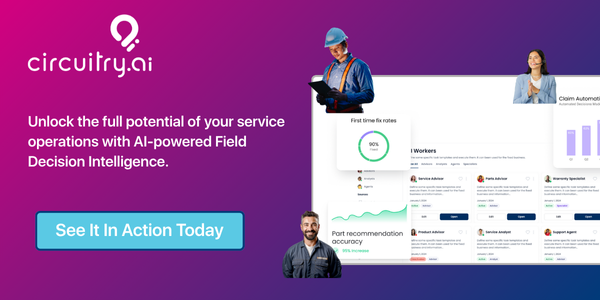For decades, manufacturers and service organizations have relied on Field Service Management (FSM) systems to plan, dispatch, and execute service operations efficiently. These systems helped coordinate technicians and manage work orders, a significant leap forward in operational control.
But as service expectations rise and business models shift from reactive repairs to predictive and outcome-based service, FSM systems alone are no longer enough. The next leap forward is Field Decision Intelligence (FDI), an AI-powered layer that transforms how service decisions are made, not just how service work is managed.
Read our last blog post, Field Decision Intelligence is the next big leap, and why now is the time to invest to learn more about FDI.
What Field Service Management systems do and don’t do
FSM solutions are designed around execution:
- Scheduling and dispatch optimization
- Work order and asset tracking
- Technician enablement and mobile workflows
- Parts, labor, and inventory management
These tools are essential for running service operations, but they mostly answer the question:
“Who should go where, and when?”
What FSM systems lack is contextual intelligence, the ability to reason across historical data, predict outcomes, and guide technicians and service leaders toward the right decision at the right time.
What Field Decision Intelligence adds: the intelligence layer
FDI shifts focus from managing actions to optimizing outcomes. It applies AI and analytics to continuously learn from data across service knowledge, parts catalogs, work orders, claims, parts, assets, and customer interactions, enabling smarter decisions across the service journey.
FDI answers questions that FSM systems can’t:
- What are the right diagnostics and repair procedures?
- Which part will actually fix the issue the first time?
- Which dealer or technician pattern indicates inefficiencies?
- What’s the most cost-effective action without compromising uptime?
- Is this repair likely to recur?
- Is the warranty claim valid or inflated?
Characteristics of Field Decision Intelligence
|
Characteristic
|
Description
|
|
Outcome-oriented
|
Focuses on the “Right Fix, Right Part, Right Time”, not just closing tickets.
|
|
Cross-functional reasoning
|
Integrates knowledge, warranty, parts, quality, and customer data into unified decision intelligence models.
|
|
Continuous learning
|
AI models improve over time through feedback loops across repairs, claims, and outcomes.
|
|
Prescriptive and predictive
|
Moves beyond dashboards to actively recommend the next best actions.
|
|
Autonomous and augmented
|
Enables AI Agents and Advisors that can score claims, guide technicians, and trigger workflows automatically.
|
FDI works alongside the existing FSM system, amplifying its capabilities. Think of FSM as the system that gets the technician to the job site, and FDI as the intelligence to complete the job right the first time using the right parts and most cost-effectively.
Why FDI is critical to achieve service outcomes
Modern service organizations compete on response times, uptime, first-time fix rates, and cost efficiency. Achieving these outcomes requires decisions that are consistent, explainable, and optimized across thousands of daily service events.
FDI delivers that by:
- Turning every service interaction into a learning opportunity.
- Eliminating decision variability between technicians or locations.
- Improving warranty recovery and reducing unnecessary costs.
- Powering outcome-based service models with measurable intelligence.
How AI powers FDI
AI is the engine behind Field Decision Intelligence:
- Natural language understanding interprets technician notes, fault codes, and service histories.
- Autonomous AI Workers like Service Advisors and Parts Advisors act as digital teammates to human service teams.
- Decision models predict parts, cost, and outcome trade-offs before action is taken.
- Predictive analytics forecast failures, parts demand, and service risks.
Together, these capabilities turn data noise into intelligent service decisions that improve productivity, outcomes, and efficiency (POE).
The future of service is intelligent, not just managed
The transition from FSM systems to FDI marks a defining moment in how service organizations operate.
The organizations that move first will deliver better service and redefine the economics of service.
.png?width=615&height=478&name=fdi-graphic%20(1).png)
.png?width=415&height=50&name=GARTNER-NOTE-CTA%20(1).png)
Ready to Elevate Your Service Decisions?
At Circuitry.ai, we help manufacturers and service organizations move beyond traditional FSM systems into the age of Autonomous Service Journeys, powered by Field Decision Intelligence.
Our AI Advisors and Decision Intelligence platform enable faster, smarter, and more profitable service outcomes.
See how to achieve “Right Decision Every Time.” Contact Us to learn more or schedule your FDI demo today.
